As the most forgotten and persecuted minority who used to live in Rakhine State for centuries, the women and children are the most suffering Rohingyas by the Myanmar military's violent purge.
Moreover, the death risk for the Rakhine natives continues due to malnutrition and unsanitary environment even after they flee to Bangladesh.
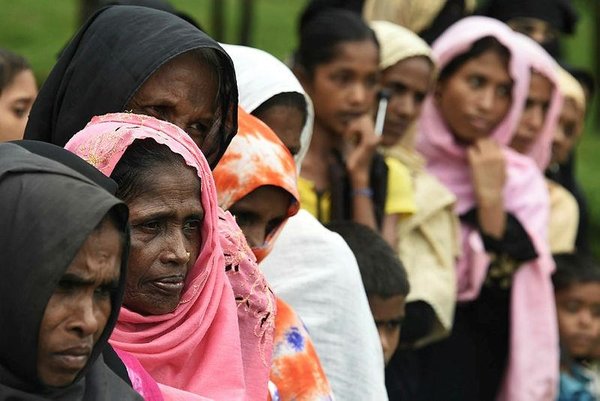
* Rohingya refugees wait in line for relief supplies in the refugee camp of Leda near Teknaf (AFP Photo)
When Anadolu Agency visited an area along Bangladesh's border with Myanmar, some 75 kilometers (46 miles) southeast of Cox's Bazar city, dozens of Rohingya Muslims could be seen walking towards the Bangladesh side in the pitch-black night.
Sura Katu, a 55-year-old sick woman, who was placed and carried on a wooden seat by her two sons over their shoulders, as they tried to reach safer area.
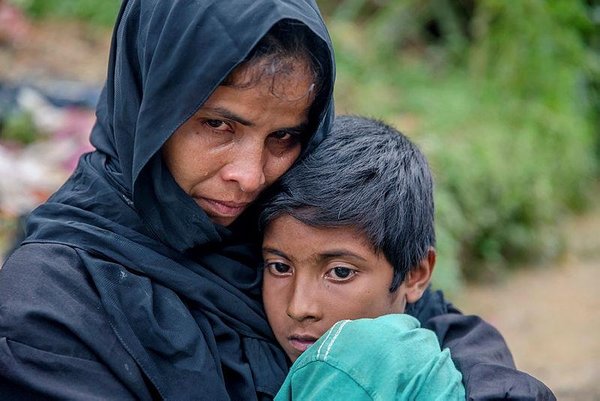
* A Rohingya Muslim woman Mustafa Begum waits for help to transport her sick son Mohammad Riyazullaha to a nearby clinic in Taiy Khali, Bangladesh (AP Photo)
When they arrived from the riverside, which remained as the last obstacle to overcome before the border, the sons started begging the boat owners for assistance, however were repeatedly rejected for not having enough money.
Amid the desperation and the perilous plight, they jumped for joy as they were told that they would be taken to where ever they would want to go by a boat filled with Turkish journalists and volunteers.
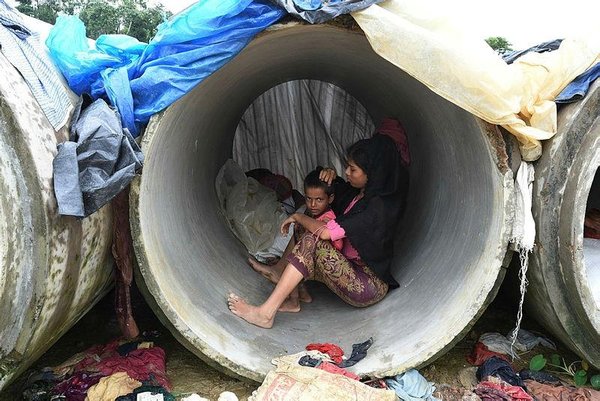
* Rohingya Muslim refugees shelter in cement pipes at Kutupalong refugee camp in the Bangladeshi district of Ukhia (AFP Photo)
"I do not know what to say," Rasul ebulliently said as he was trying to protect his mother from the heavy monsoon rain on a boat. "She is very sick and we have been walking for 10 days."
He said that they had to sleep in the fields, forests and waysides to hide from the Myanmar military and security forces as well as radical Buddhist monks' brutal attacks.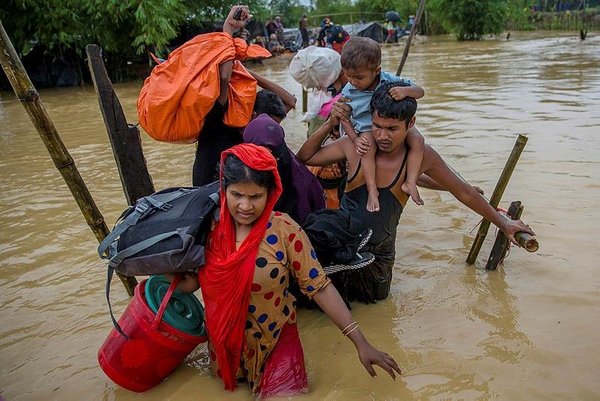
"I have been sick for a long time and whenever it became unbearable for me, I was going to Bangladesh to be treated, because they do not allow us to go hospitals in Myanmar" the mother told Anadolu Agency. "But I could not even go to Bangladesh after they started attacking the villages."
"It was always hard to go to other side but at least we could come back to our own land," Sura added, saying that they left their village permanently this time.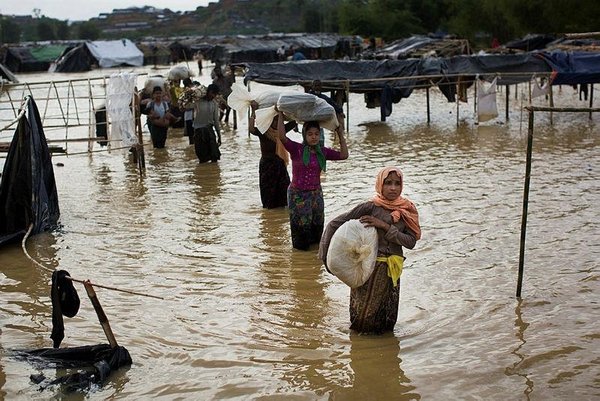
When asked if they knew anyone in Bangladesh who could assist and host them, she simply said "No" with a shaky voice.
Reaching the Bangladesh border after about half an hour of boat voyage, the Katu family had gone out of sight on foot in the dark.FAMILIES TORN APART
Last October, following attacks on border posts in Rakhine's Maungdaw district, security forces launched a five-month crackdown in which, according to Rohingya groups, around 400 people were killed.
The UN documented mass gang rapes, killings -- including of infants and young children -- brutal beatings, and disappearances committed by security personnel. Investigators said such violations may have constituted crimes against humanity.
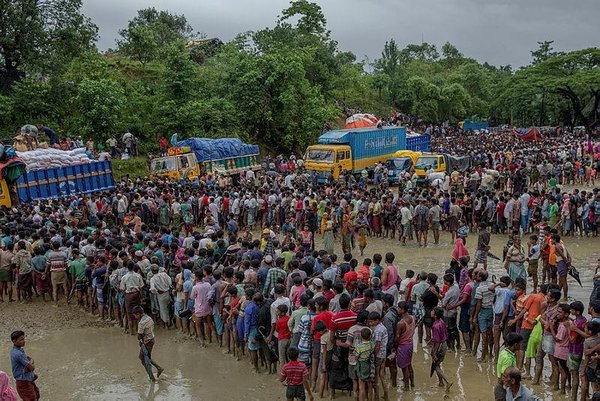
* Rohingya Muslims, who crossed over from Myanmar into Bangladesh, wait for their turn to collect food aid near Kutupalong refugee camp, Bangladesh (AP Photo)
Shofika Alom, 9, is another child victim of Myanmar military and the only survivor of a family of four. Her father, mother and little brother were killed by mortar fire during a military raid in their village in Moungdaw province.
Shofika has been saved and smuggled to Bangladesh side by a Rohingya family who also fled Myanmar due to violence.
"She was just standing and watching around, while everybody else were making attempt to escape the town," Rukhiya Ajizul, a mother of three children told Anadolu Agency. "We decided to bring her with us the moment we noticed that her entire family was slaughtered."
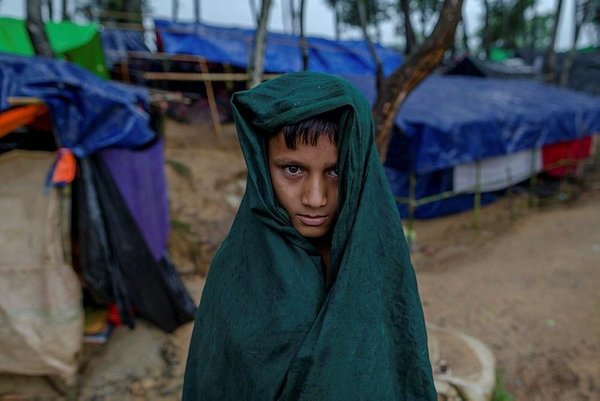
* A Rohingya Muslim boy, Mohammad Noor, who crossed over from Myanmar into Bangladesh, stands outside his shelter as it rains in Kutupalong refugee camp, Bangladesh (AP Photo)
Shofika, who wraps a towel that she found because she does not have any clothing, remained silent when asked about her family's name and what she needs the most at the moment. However she begun reciting a Surah from the Qur'an, which is the central religious text of Islam.
Unicef says 60 percent of the fleeing Rohingya are children. Around 1200 children have come without their father, mother or any family member.
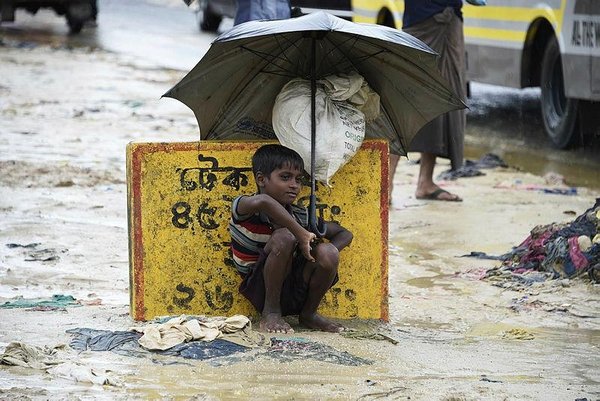
* A young Rohingya refugee shelters from the rain with an umbrella while sitting at Kutupalong refugee camp in the Bangladeshi locality of Ukhia (AFP Photo)
The Ajizul family and Shofika now live in a make shift, one-room house together and are not even able to meet their basic needs such as cooking pots, mats, food, hygiene materials.